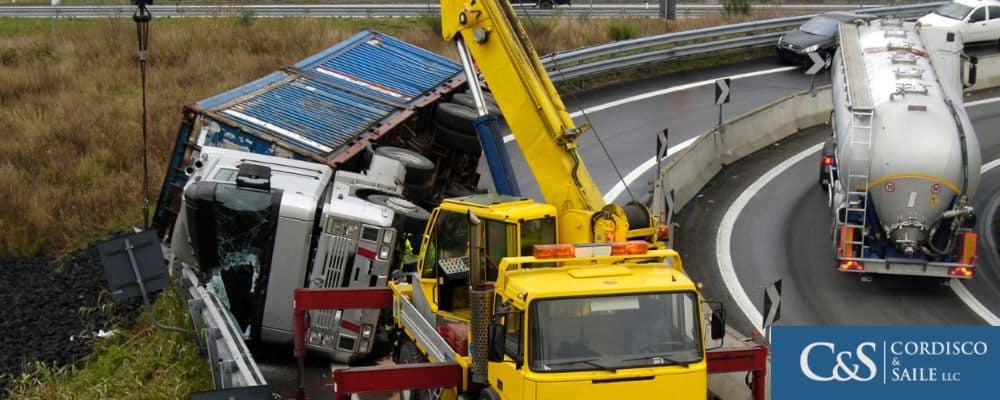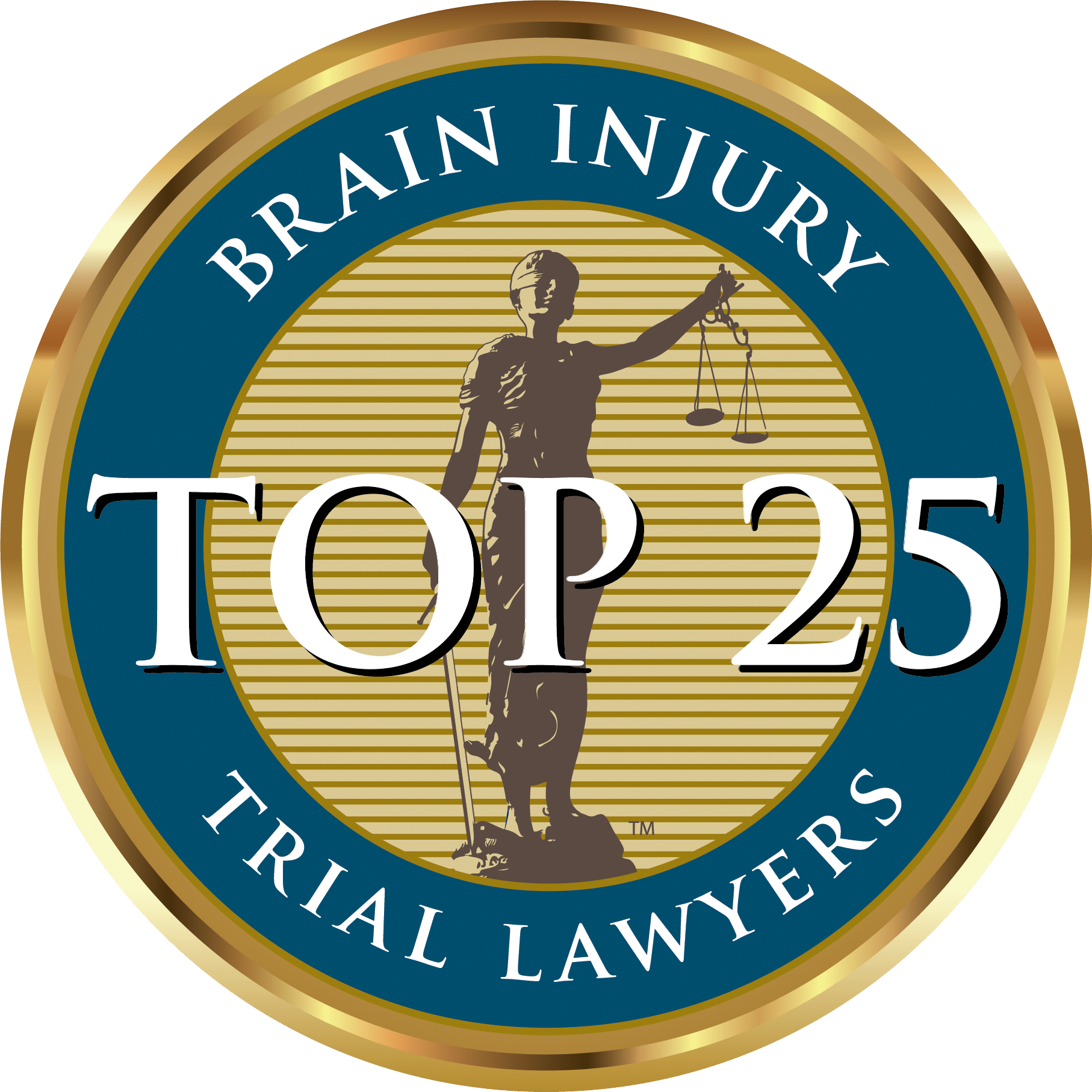
When you’ve been in an accident with a truck, the first two things you should do are call the police and seek medical attention for any injuries. After that, you can worry about determining fault or filing a lawsuit.
If you’ve been in a truck accident in Pennsylvania, you need a lawyer with the experience and skill to fight for you and go the distance in court. The nationally recognized team at Cordisco & Saile LLC can help.
Key Takeaways
- Determining who is liable for a truck accident isn’t always easy. The loading company, maintenance workers, truck drivers, trucking companies, truck manufacturers, or truck owners may all be responsible.
- To build your case, you’ll need evidence such as medical records, black box data, and maintenance records.
- To prove negligence, you need to show that the defendant owed you a duty of care, the defendant breached that duty, and the breach resulted in the accident and your damages.
- You can file for damages in a truck accident even if you are partially at fault. Your share of liability cannot exceed that of the defendant, and your damages will be decreased in proportion to your fault.
Understanding Liability in a Truck Accident Case
Who is responsible for a trucking accident varies based on what contributed to the cause of the crash. Any of the following entities may be liable for a truck accident liability:
- Loading companies
- Maintenance workers
- Truck drivers
- Trucking companies
- Truck manufacturers
- Truck owners
In most cases, the responsibility may rest with a combination of everyone involved. For example, if the truck driver was speeding and the rig had defective brakes, both the truck driver and the brake manufacturer could be liable.
What Evidence Is Needed in a Truck Accident Case?
To proceed with your case, you’ll need evidence to establish liability for your accident. Relevant evidence may include any of the following:
- Medical records: Your medical records will establish the nature and extent of your injuries and the medical consequences of the crash.
- Police crash report: When called to a car accident scene, police will take statements from you, the truck driver, and any witnesses. They’ll also investigate the scene for physical evidence, such as tire marks and debris, and take pictures and videos. They’ll create a report based on their findings that can provide key information and lead to critical evidence.
- Eyewitness accounts: People who witness the crash may notice things the police can’t determine through the physical evidence of the crash.
- Photos or video of the crash: Video from dashboard cams, security camera footage, or bystanders can clearly show what happened before and during the accident. For example, a business security camera may show the truck driver running a red light.
- Black box data: Like planes, trucks have black boxes—electronic devices that record data such as the truck’s speed, when the driver shifted gears, brake timing, and more. This data can paint a clearer picture of the driver’s actions before and during the accident, but the information is regularly recorded over. Thus, you’ll want to request this data right away.
- Hours of Service logs: Truck drivers must comply with specific hours of service regulations. Their log can help you and your lawyer determine if they exceeded the hours of service rules, putting you at risk.
- In-cab camera: Like many cars on the market today, trucks are equipped with cameras, including in-cab cameras that record drivers’ behavior. This footage can show what happened before, during, and after the accident.
- Hiring and supervision records: Each truck company keeps employment records showing whether the driver had any disciplinary action against them or if the company properly vetted them. These records may also include drug and alcohol testing.
- Maintenance records: Consult these records to determine if maintenance workers and the trucking company properly maintained the truck.
- Physical evidence: Evidence from the crash scene can help investigators reconstruct the collision to determine liability.
- Cell phone records: Discover if the truck driver was on their phone before the crash.
- Your financial records: Financial records, such as bank statements, tax returns, and paystubs, highlight the economic cost of the crash.
- Your workplace records: Workplace records illustrate how the crash impacted your ability to work, whether it caused you to lose wages or made it more difficult or even impossible to do your job.
Gathering evidence after a crash can be complicated and overwhelming, especially if you are recovering from your injuries or mourning the death of a loved one from a crash. To ensure you get the best evidence, you need to start gathering it quickly and efficiently. Not everyone will willingly hand it over to you.
Cordisco & Saile LLC’s injury attorneys work hard to remove as much stress from the process as possible. We’ll take on the massive task of gathering and sifting through the evidence to build a powerful case.
Proving Negligence in a Truck Accident
Negligence happens when a party fails to act as a reasonable person would to prevent harm to others. For example, a person who drives under the influence is negligent because a reasonable person would not endanger others in this way.
In Pennsylvania, you’ll need to establish the following elements:
- The defendant, such as another driver or trucking company, owed a duty to act with reasonable care and avoid the accident.
- The defendant breached their duty of care through negligent behavior.
- Their negligent behavior caused the accident.
- You suffered damages as a result of the accident. These damages can be economic losses, such as medical bills and lost wages, or non-economic losses, such as pain, suffering, and emotional distress.
Pennsylvania’s average truck accident settlement varies based on the circumstances, but it can be in the millions.
Hiring a personal injury lawyer in Pennsylvania gives you a better shot at proving negligence than if you represented yourself, especially when multiple negligent parties are involved. A skilled and experienced lawyer gives you a better chance of getting the settlement you deserve.
Pennsylvania Truck Accident Laws
Truck accidents are often more severe than other crashes due to the size difference between trucks and passenger vehicles. You can pursue compensation from anyone whose behavior contributed to the accident.
Pennsylvania law dictates that drivers, truck owners, trucking companies, loading companies, manufacturers, and maintenance personnel have a duty of care toward other drivers. This means they are obligated to take reasonable care to protect others. Violating duty of care can result in liability for the accident.
This duty of care imposes the following requirements:
- Truck companies must comply with hours of service and other trucking regulations.
- Truck owners must ensure their trucks are safe before assigning them to drivers.
- Truck drivers must drive safely and ensure their truck is safe to drive.
- Loading companies must ensure the truck is properly loaded, adhere to capacity regulations, and obtain the appropriate permits.
- Manufacturers ensure the truck’s components are not defective.
- Maintenance personnel to ensure the truck is in good repair and safe to drive.
Pennsylvania is a modified comparative negligence state, meaning you can recover damages even if you were partially at fault for the accident. Your share of fault cannot exceed the defendant’s to recover compensation. Your recoverable damages will be reduced in proportion to your share of the fault. For example, if you are 10 percent at fault for the accident, the court would reduce your damages by 10 percent.
Pennsylvania’s statute of limitations for truck accidents sets a two-year deadline. Thus, you must typically file suit within two years after a truck accident. You will likely lose your right to pursue compensation if you miss this deadline. An attorney can determine the deadline for your case and ensure you file suit on time.
How Can Our Truck Accident Attorneys Help You?
Insurance companies know accident victims mean business when they turn to Cordisco & Saile LLC for representation. Our firm has been practicing personal injury law for 30 years with a record of recovering millions of dollars for our injured clients. Our motto is “People come first,” and we see you as a person first and an accident victim second.
If you’ve been injured in a truck accident in Bethlehem, Langhorne or any other cities throughout Pennsylvania, contact our attorneys at Cordisco & Saile LLC today for a free consultation, or call us at (215) 642-2335.






